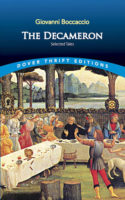A “Love Letter” to Writing on Plague
Where have you been all my life, Giovanni?
You’d think that, studying lit, I’d have read Boccaccio’s Decameron during my studies, but somehow, that was not the case. Feeling guilty about that, I bought a copy last year, and the timing couldn’t have been better than the present to actually read it.
Full disclosure: mine isn’t the complete text but 25 stories chosen for this edition, but I’m still glad to have gotten around to it at some point in my lifetime because—even with what appears to be a somewhat “clunky” translation—I regret the years of never having visited this work. I’ve long known how Boccaccio inspired Chaucer, after translating it into English, to write The Canterbury Tales, but readers can also see the influence that this has had on many future writers.
In the first story of day one, Boccaccio recounts tale of a conman wrangling near-sainthood from the Church, a character reminding me of Moliere’s Tartuffe with a trace of Nikolai Gogol’s Chichikov in Dead Souls.
And so it goes.
By the way, that plagiarism of Vonnegut is not accidental since his view of human behavior and character are here as well. One even sees traces of Shakespeare in these ribald, often downright dirty tales that are occasionally a dark but always fascinating peek into the human condition—something that hasn’t changed much despite all our other advances. Written in a style very much in the oral tradition of storytelling, Boccaccio’s narrators regale each other during a time of plague, proving how important “stories” are to our spiritual, cultural, moral as well as mental health.
Anyone willing to take a deep dive about 700 years back will find a worthwhile literary journey in these pages. Plus it’s easily found it online!
The Decameron of Giovanni Boccaccio by Giovanni Boccaccio.
Reviewer bio: Bill Cushing writes and facilitates a writing group for 9 Bridges. His poetry collection, A Former Life, was released last year by Finishing Line Press.





